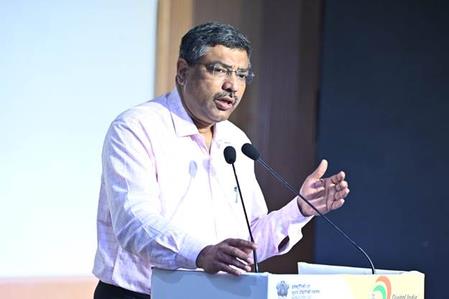
Need To Streamline Notices To Intermediaries To Curb Unlawful Information: S. Krishnan
With the rapid growth of digital platforms, there has been a surge in unlawful information on IT intermediaries and social media platforms, violating various legal provisions.
To curb this unlawful information, Section 79(3)(b) of the IT Act, 2000 empowers the concerned Ministries, Departments, and State/UT to send notices to IT intermediaries to remove or disable the access of such information.
In this context, the IT Ministry organised a workshop aimed to sensitise participants on key provisions of the IT Act, 2000, and IT Rules, 2021, particularly Sections 69A and 79(3)(b), and Rule 3(1)(d).
The idea was to promote a clear understanding of their application in ensuring responsible digital governance and effective content management.
MeitY Secretary S. Krishnan elaborated on the scope and intent of the IT Act. He explained that Section 69A empowers the government, in its executive capacity, to block online content in cases where it threatens national security, public order or friendly relations with foreign States.
“Section 79, on the other hand, places intermediaries on notice regarding their obligations and potential liability in case of non-compliance, while final adjudication rests with the judiciary,” he noted.
He also stressed upon the need for a suitable format - notices under Section 79(3)(b) containing directions/orders similar to Section 69A must be carefully avoided as the scope of both the provisions are entirely different.
The language must be clear coupled with relevant legal provisions. He added that the appropriate government or its agency, as custodians of power, must exercise the powers cautiously.
In other words, the powers must be exercised in a prudent manner so that they withstand the judicial scrutiny and also balance the fundamental rights guaranteed under the Constitution of India, Krishnan said.
Ajit Kumar, Joint Secretary (Cyber Laws), highlighted the increasing challenges arising from fake news, misinformation, and the misuse of information technology.
He noted that deficiencies in notices often lead to judicial challenges, underscoring the need for a comprehensive and standardised approach while drafting them.
-IANS
na/

Legal Disclaimer:
MENAFN provides the
information “as is” without warranty of any kind. We do not accept
any responsibility or liability for the accuracy, content, images,
videos, licenses, completeness, legality, or reliability of the information
contained in this article. If you have any complaints or copyright
issues related to this article, kindly contact the provider above.

















Comments
No comment